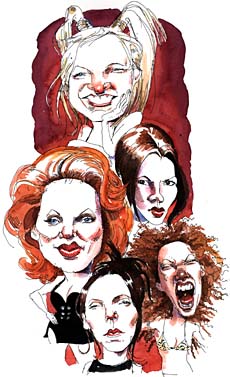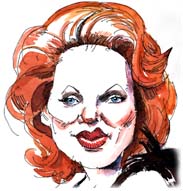The Spice Girls
Cherish these cheeky hucksters before they're gone.

Two omens of apocalypse: A few months ago, newspapers in Britain and North America--respectable newspapers--ran the following headline: "Geri Loses a Nail." Geri was Geri Halliwell (a k a "Ginger Spice"), one of the five Spice Girls. The nail was a fingernail.
Last week, the Spice Girls performed for 27,000 fans in Johannesburg. Nelson Mandela was there. He said, "These are my heroes. This is one of the greatest moments of my life."
Even if you're not a pre-adolescent or South Africa's living saint--and Slate's demographic surveys strongly suggest you're neither--you have probably heard the Spice Girls ("Tell me what you want, what you really really want"). And you have undoubtedly heard of the Spice Girls, who are five of the
It is hard to overstate the Spice Girls' influence on popular culture, especially in Britain. Cabinet ministers

It is the time to cash in. There have, of course, been plenty of teeny-bopper idols--New Kids on the Block, Take That, Tiffany, Vanilla Ice, Menudo (Hollywood's byways are littered with their corpses)--but none has ever been as well marketed as the Spice Girls. They are, essentially, a poll-tested band. A British promoter picked them from an open audition based on their looks and spunkiness. None of them is a professional singer or dancer--unless you count strip-club experience. Only Mel B., who once played drums, has ever been a professional musician. Their music, too, is poll-tested. The radio-friendly singles on Spiceworld are watered-down versions of popular pop genres--disco, funk, world beat, Motown, etc. They are to pop music what mall food courts are to ethnic food. "Spice Up Your Life," for example, is Latin pop, while "The Lady Is a Vamp" is a big-band tune.
But the music is an afterthought. The Spice Girls represent the Jurassic Parkification of pop. In the movie industry, spinoff products now account for a huge percentage of profits. The Spice Girls bring the same spinoff sensibility to music. Sure, there were Beatles lunch boxes and Michael Jackson gloves. But they were peripheral to the music. Life is different in Spiceworld. If there is a product that 12-year-olds use, there will be a Spice Girls version of it in your mall by Thanksgiving. Look for Spice Girls backpacks, trading cards, action figures, duvets, perfumes, potato chips, lollipops. Children will buy Spice Girl-shaped chocolates, Polaroid Spicecams plastered with Spice Girl stickers, and Spice Girl deodorant--in one of five different Spice scents. A toy company's stock rose 20 percent when it won the license to distribute Spice Girl action figures. A clothing store's stock fell 40 percent when it underestimated the demand for Spice Girl-style outfits.

The high point--or, depending on your view, the low point--of Spice promotion is the group's Pepsi deal. The Spice Girls wrote a commercial jingle for Pepsi's "Generation Next" ad campaign. Then they included the jingle on Spiceworld. You hear the jingle, you buy the album. You buy the album, you hear the jingle. Pepsi sells more Pepsi. The Spice Girls sell more Spiceworld. This is what businesspeople call synergy and musicians call prostitution. Whatever it is, it pays. According to some estimates, the five girls stand to earn $300 million in the next year.
Critics, naturally, are appalled. The marketing juggernaut, derivative music, and moronic lyrics annoy music writers. The Spice Girls, according to reviews, are "awful" and "extraordinarily untalented." During their rise to fame, the girls wisely avoided giving concerts; when they finally performed live (on Saturday Night Live), critics panned them. They "can neither sing nor dance."
And yet, the girls are not as bad as all that. No matter how
The most endearing quality of the Spice Girls is their very crassness. They are products of this ironic, shrugging age. They are more than happy to sell out and more than happy to make fun of themselves for doing it. History tells us that the life of the average pop sensation is a mere 18 months: a meteoric rise to a brief and spectacular reign, followed by flameout. (Just ask New Kids on the Block. All that remains of them is Boogie Nights star Mark Wahlberg, a brother of one of the band members.)
What does this calendar tell us about the Spice Girls? They arrived in the summer of 1996. So they'll be gone by this winter--just as soon as the Christmas shopping season is over.
